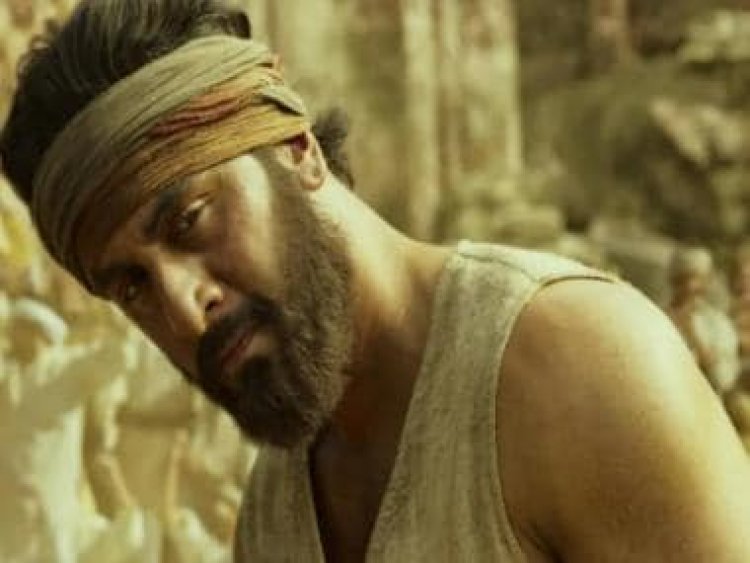Shamshera movie review: A politically evolved version of Baahubali fronted by a gorgeous Ranbir Kapoor
Shamshera movie review: A politically evolved version of Baahubali fronted by a gorgeous Ranbir Kapoor

Language: Hindi
This is the second Indian film this week that merits a mention of Baahubali in its review. S.S. Rajamouli’s Telugu blockbuster, while politically problematic no doubt, was such a milestone for Indian cinema in many ways that it’s natural for it to be a reference point for filmmakers and analysts alike. Neither of these two new releases is a tribute though. While Abrid Shine’s Mahaveeryar (Malayalam) is a spoof of the mytho-fantasy genre that many writers and directors have tried to replicate since Baahubali’s success, Karan Malhotra’s Shamshera (Hindi) dramatically overturns the supremacist status-quoism of Rajamouli’s franchise even while borrowing its basic story template and larger-than-life expensive packaging.
Shamshera takes off with a voice-over and illustrations about the Mughals defeating a particular people in Rajputana who flee the invaders and head off to another part of India where they find themselves subjugated by those they considered their own. In their new home they are exploited, demeaned and marginalised. They are “neech jaat” (low castes), to quote the language of the film’s prime villain.
Ranbir Kapoor plays Shamshera, a leader of this oppressed community, the Khamerans. Shamshera is the story of two generations of his family in the 19th century fighting the British colonisers and India’s oppressive upper castes for their azaadi.
The first surprise in Shamshera comes with the briefness in the representation of the Mughals. In recent years, this dynasty and other Muslim communities have been repeatedly depicted as the exemplification of violence against hapless Indians in mainstream Hindi cinema, epitomising bloodlust and betrayal even to the extent of distorting actual historical situations where, in reality, Muslims fought the British Raj while other Indians allied with the white colonisers. For an example, look no further than the insidious Akshay Kumar starrer Kesari. Shamshera does not whitewash Mughals at war (thankfully), but its focus remains the treachery of those who would be considered one of “us” in the dominant contemporary socio-political discourse. Symbolising that treachery is the deliciously named Shudh Singh played by Sanjay Dutt.
Shamshera and his son Balli (also Ranbir Kapoor) are the most unexpected warriors against India’s caste system to emerge from commercial Hindi cinema. Malhotra’s film is the best education on how caste politics affected India’s equation with the British imperialists that you could hope for in mainstream popular culture, with all the trappings of massy cinema that Bollywood lovers are accustomed to and some more – solid acting for the most part, Mithoon’s invigorating music, lively dances, spectacular sets and costumes, luscious natural scenery, good-looking lead actors and the amazing Anay Goswamy’s cinematography designed to giganticise everything on screen.
Ranbir is gorgeous in every imaginable way in Shamshera – in terms of his acting, sex appeal, dancing, litheness in the action scenes and magnetic personality. But the megastars of this relentless pageant of pomp coupled with substance are its writers: screenplay – Ekta Pathak Malhotra and the director himself (who earlier made Agneepath), story – Nilesh Mishra and Khila Bist, dialogues – Piyush Mishra
This is not to suggest that Shamshera’s worldview is beyond criticism. Not at all. For one, Vaani Kapoor’s Sona is redundant beyond her role as Balli’s lover, the object of his desire and very briefly in the second half, his partner in his fight against Shudh Singh. She is ultimately just a glamorous sidelight – and inexorably objectified – in a male universe where all the action is in the hands of men and the only significant women characters exist in relation to the male protagonist, one as his mother, the other as his romantic partner.
In its bid to lambast upper-caste cruelty, the film is also too gentle on the British, possibly because showing both as equally horrific in their own way calls for greater nuance than the present script requires.
And while it is wonderful that Shamshera stands Baahubali’s regressive politics on its head, the writers might consider why they still felt the need to show Khamerans genuflecting before their chosen leader and his bride in a film that otherwise rejects the subordination and advocates rebellion.
These are disappointing flaws in a film that, for multiple reasons, is worthy of a standing ovation. Shamshera is a stinging condemnation of the caste system, unprecedented for its mainstream format and the foregrounding of its caste theme in a Bollywood that has for too long largely avoided a conversation on caste. Case in point: Dhadak, the terrible Hindi adaptation of the excellent Marathi blockbuster Sairat. Shamshera recognises and underlines its belief that caste atrocities are no less condemnable than colonisation by an alien force. If anything, it is worse.
It becomes possible to grant this film some indulgences, idiosyncracies and its visual resemblance to earlier iconic films, since it is brimful of courage and conviction. So, for instance, that train robbery in Shamshera is wolf-whistle material, but the special effects could have been better. Sanjay Dutt overacts. And the hero's miraculous recovery from being stabbed in the upper torso is laughable. But well, these issues at least can be forgiven in a film that has a major character saying, “Is there a greater mask in this world than religion?” and the word “shudh” is used in conjunction with the name of a caste that is deemed lowly.
Bravo Yashraj Films and Karan Malhotra! Bravo Team Shamshera.
Rating: 3.5 (out of 5 stars)
Shamshera is in theatres
Anna M.M. Vetticad is an award-winning journalist and author of The Adventures of an Intrepid Film Critic. She specialises in the intersection of cinema with feminist and other socio-political concerns. Twitter: @annavetticad, Instagram: @annammvetticad, Facebook: AnnaMMVetticadOfficial
Read all the Latest News, Trending News, Cricket News, Bollywood News, India News and Entertainment News here. Follow us on Facebook, Twitter and Instagram.
What's Your Reaction?





























































